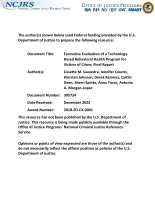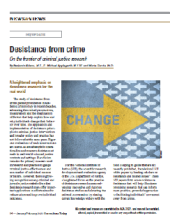Community organizations
Creating a Digital Trauma Informed Space: Chat and Text Advocacy for Survivors of Violence
A Whole Community Approach to Hate Crime Reduction: Research to Improve Prevention, Reporting, and Victim Support
Using Community-Based Participatory Research to Advance Transformative Credible Messenger Mentoring for Justice-Involved Youth of Color
Evaluating Processes and Outcomes of Housing Models for Victims of Human Trafficking
Mapping the Continuum of Support for Violent Extremism in the United States
Positive Adolescent Interpersonal Relationships (PAIR): A Community-Based STRiV Study
Inclusive Research: Engaging People Closest to the Issue Makes for Better Science & Greater Impact; 2023 NIJ Research Conference Plenary
This panel will discuss what inclusive research is, how to conduct it, and what issues and challenges exist about engaging in it. “Inclusive research” has its history as a participatory research method designed to ensure people closest to the issue or problem under study are authentically engaged in the research process rather than simply being “research subjects.” While community-based participatory research has begun to take on greater prominence in the criminal justice realm, such efforts are largely confined to qualitative research inquiries.
See the YouTube Terms of Service and Google Privacy Policy
Police Use Science and Community Partnerships to Reduce Gun Violence
NIJ Journal Issue No. 231
Just Science Podcast: Just Family Support During Death Investigations
Formative Evaluation of a Technology-Based Behavioral Health Program for Victims of Crime, Final Report
Evaluation of a Community-focused Violence Intervention and Prevention Program
Real-world Engagement & Turnover Analysis to Inform New Solutions (RETAINS): An Evidence-Based Policing Workforce Study
Assessing the reliability of modern µXRF technology for expanded impact on the forensic examination and interpretation of trace evidence
Community Policing in Seattle: A Model Partnership Between Citizens and Police
Research on Domestic Radicalization to Violent Extremism: Insights from Family and Friends of Current and Former Extremists
Cognitive Behavioral Theory, Young Adults, and Community Corrections: Pathways for Innovation
A Research-Based Practice Guide to Reduce Youth Gun and Gang/Group Violence
Desistance from Crime: On the Frontier of Criminal Justice Research
Multilevel Evaluation of Project Safe Neighborhoods
Project Safe Neighborhoods (PSN) is a DOJ-sponsored initiative to reduce violent crime, particularly gun crime, by fostering cooperation by criminal justice agencies and local partners to develop and implement strategic approaches.
See the YouTube Terms of Service and Google Privacy Policy
NIJ-Funded Research on Firearms Violence in Urban Cities Advancing Scientific Evidence to Inform Practice
In this full thematic panel, renowned experts will present a series of papers summarizing the newest findings of NIJ-funded research projects on criminal offenses with firearms in urban areas. Researchers used various criminological and other theories, including routine activity theory, socio-ecological and socio-environmental perspectives, and advanced mixed-study methods, including surveys and spatio-temporal designs, to produce scientific evidence to inform practice.
See the YouTube Terms of Service and Google Privacy Policy






